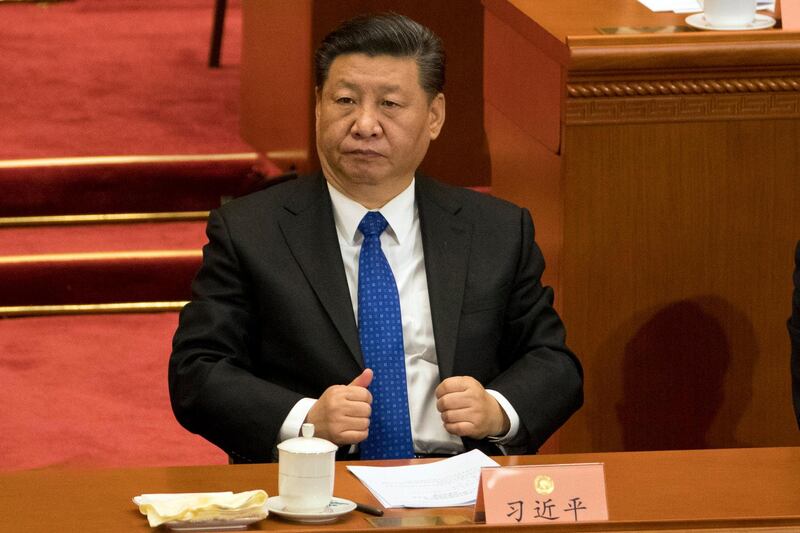President Xi Jinping is poised to make a historic power grab as China's legislators gather from Monday to approve changes that will let him rule indefinitely and undo decades of efforts to prevent a return to crushing dictatorship.
This year's gathering of the ceremonial National People's Congress has been overshadowed by Mr Xi's surprise move — announced just a week ago — to end constitutional two-term limits on the presidency. The changes would allow Mr Xi, already China's most powerful leader in decades, to extend his rule over the world's second largest economy possibly for life.
"This is a critical moment in China's history," said Cheng Li, an expert on elite China politics at the Brookings Institution in Washington.
The move is widely seen as the culmination of the 64-year-old Mr Xi's efforts since being appointed leader of the ruling Communist Party in 2012 to concentrate power in his own hands and defy norms of collective leadership established over the past two decades. Mr Xi has appointed himself to head bodies that oversee national security, finance, economic reform and other major initiatives, effectively sidelining the party's number two figure, Premier Li Keqiang.
Once passed, the constitutional amendment would upend a system enacted by former Chinese leader Deng Xiaoping in 1982 to prevent a return to the bloody excesses of a lifelong dictatorship typified by Mao Zedong's chaotic 1966-1976 Cultural Revolution.
"Deng Xiaoping's abolishment of lifetime tenure for the leadership and more institutionalized transitions in power are very much in question," Mr Li said.
_______________
Read more:
[ Trump's metal tariffs plan sparks backlash at home and abroad ]
[ Xi Jinping tells Chinese billionaires to play by the rules ]
_______________
Passage of the proposed constitutional amendment by the congress' nearly 3,000 handpicked delegates is all but certain. But observers will be looking to see how many delegates abstain from voting as an indication of the reservations the move has encountered even within the political establishment.
Chinese authorities have tightly controlled discussion about the removal of term limits, scrubbing social media of critical and satirical comments. State media have been largely muted about the topic, but the official People's Daily sought to reassure the public by saying in a commentary that the move did not signal a return to lifelong rule.
"This amendment does not mean changes in the system of retirement for party and state leaders and also does not imply that leaders will have lifetime tenure," the party's mouthpiece said on Thursday.
Still, a number of prominent Chinese figures have publicly protested the move, despite the risk of official retaliation.
Li Datong, a former editor for the state-run China Youth Daily, wrote that lifting term limits would "sow the seeds of chaos" and urged Beijing's lawmakers to exercise their power by rejecting the amendment. Wang Ying, a businesswoman who has advocated government reforms, called the proposal "an outright betrayal."
Many expressed shock and disbelief at what they perceived to be a return to the Mao era, and the massive upheaval, violence and chaos of the Cultural Revolution 50 years ago that has barely faded from memory.
Already, the blanket and entirely positive coverage of Mr Xi in official propaganda has drawn comparisons of a cult of personality to rival Mao's.
State network China Central Television broadcasts near-daily segments featuring anyone from factory workers and farmers to space engineers and soldiers applauding for Xi in uniform enthusiasm for several minutes. His airbrushed, blemish- and nearly-wrinkle-free face often dominates the front pages of state newspapers.
But some analysts note there are a number of key differences between Xi and communist China's revolutionary founders that mean any major policy failure could obstruct Xi's ambitions.
"Xi Jinping is not loved and admired the way that Deng Xiaoping was. Xi Jinping is feared within the party," said Steve Tsang, director of the China Institute at London's School of Oriental and African Studies.
Mr Xi has also overseen an expansive anti-corruption crackdown that some perceive as at least in part a purge of his rivals. This has surely won him many enemies, making the prospect of ceding power potentially risky.
Mr Tsang said the party would follow Xi as long as things went well but that any serious economic misstep over the next five years would threaten Xi's ability to extend his rule.
"I don't think it's a foregone conclusion that he will have a third term," Tsang said.
Mr Xi's power grab will be seriously tested by how he tackles grave challenges at home and abroad.
Chief among them is slowing growth in the state-dominated economy that is forecast to fall further as regulators try to get rising debt in check by tightening controls to cool booms in bank lending and real estate sales.
Abroad, China is faced with the task of maintaining stability and avoiding the outbreak of war on the neighbouring Korean Peninsula, while also managing escalating frictions with the US that threaten to evolve into a trade war.





